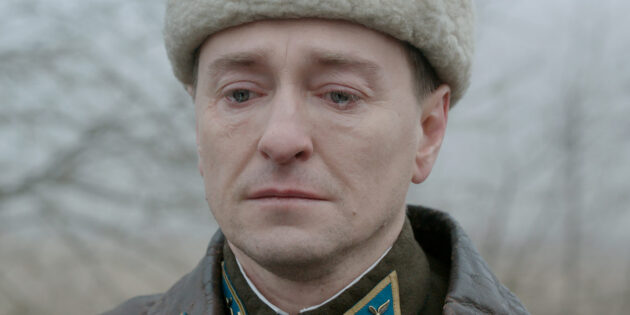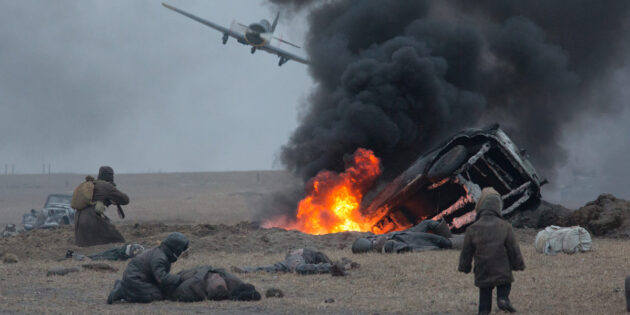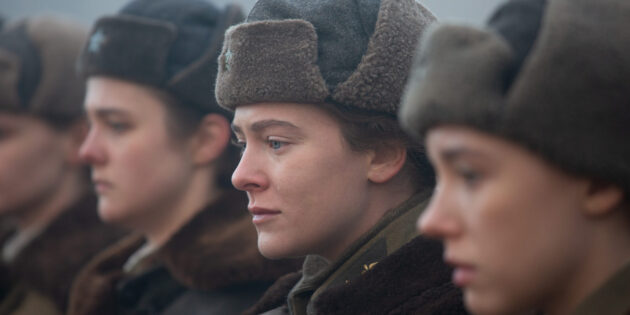On January 18, the Russian military drama "Air" by Alexei German Jr. was released. The main roles in the film were played by Anastasia Talyzina, Aglaya Tarasova, Kristina Lapshina, Elena Lyadova and Sergey Bezrukov. We tell you how this film surprises and upsets.
Early spring of 1942. The Germans are advancing, but the Soviet army is failing: the enemy surpasses it in everything — even as walkie-talkies. Pilots are constantly being shot down, so a replenishment is sent to the front — a female detachment without combat experience, forced to immediately engage in aerial battles.
It would seem that the plot is standard, but the heroes of "Air" differ from the puppets, which are often shown in the domestic military cinema: for example, in "T‑34". They have feelings, personal stories, and traumas.
The main character, the orphanage Zhenya, performed by Anastasia Talyzina, turns out to be the daughter of an enemy of the people. Her father dared to write a letter to Moscow saying that the new aircraft engines were not ready for operation, for which he paid. Although the pilots themselves admit: the engines are heated, they eat oil and at the same time are significantly inferior to the German ones in power.

Lieutenant Colonel Astafyev, played by Sergei Bezrukov, also turns out to be an atypical soldier. He suffers the main emotional shocks: the death of subordinates and loved ones. Already in 1943, Astafyev admits that he began to get used to deaths — and he does not like it.
At the same time, the characters do not slip into endless complaints. Screenwriters Elena Kiselyova and Alexey German Jr. deftly balance between the manifestations of heroism and the revelations of soldiers. In related dialogues, those can discuss the injustice of repression and the willingness to go under bullets for the sake of the Motherland. And they don't always make brave employees out of employees. The deaths of comrades and the risk of dying yourself do not go unnoticed for everyone.
Herman is not shy about showing the characters as scum. This does not contradict the mantra of the film, which is formulated by Astafyev: "I'm not fighting for the bad in us, but for the best." The only thing that can prevent you from getting into personal dramas is the acting. Against Bezrukov's background, the others in a number of scenes seem to be just reading out the text.
The film is impressive not only dramatically. was used on the site Operation "Air": how was the shooting of one of the most technologically advanced Russian films / TASS models of Yak‑1B fighters, an LED screen the size of a four‑story house, as well as suspended, sliding and ceiling screens. The filming itself took place in several locations: in the Glavkino pavilion, in Karelia, Leningrad, Saratov and Novgorod regions.
Visually, the film looks amazing. Successful color correction makes the sky and nature cold — at the same time fascinating and frightening. In battles on the ground, the emphasis is deliberately placed on the mud in which the infantry is drowning.

The aerial battles are also impressive. Close—ups with actresses evoke associations with the recent sequel "Top Gun" - although in terms of adrenaline action, "Air" loses to him. Alexey Herman Jr.'s painting failed to cope with only one challenge: the eternal problem of such a movie. In the general battle plans, it is difficult to distinguish the planes of the main characters from the cars of their opponents, no matter how brightly the red star is painted on board.
And yet, at some point, the viewer may get bored. The picture can frighten the potential audience even before viewing with a timekeeping of 2.5 hours. For comparison, the already mentioned "Top Gun: Maverick" was 20 minutes shorter.
Moreover, the painting by Joseph Kosinski constantly fuels interest in the heroic flights of Tom Cruise and his team, and Alexey German Jr. shoots a military drama rather than an action. The next intimate dialogues of the characters by the end of the film run the risk of tiring, and the death of one of the key characters simply does not cause emotions.

The "air" came out as if half an hour longer and several years later than it should have been. Another problem of the tape is not related to itself, but to Russian cinema in general.
Every year, new high-budget films about the Great Patriotic War appear in cinemas. In 2022 there was the "First Oscar", in 2023 ‑ "The Righteous Man", and 2024 begins with "Air". Such a movie is banally tired and no longer evokes the emotions that were 14 years ago when watching "Brest Fortress".
It is worth admitting that the "Air" is still different from the typical military tapes of recent years. He raises interesting questions and does not slip into simple jingoism. But Herman still cannot overcome the general fatigue of the genre, no matter how much his drama quotes "Rage" from "1917" and no matter how much it resembles the works of Remarque.